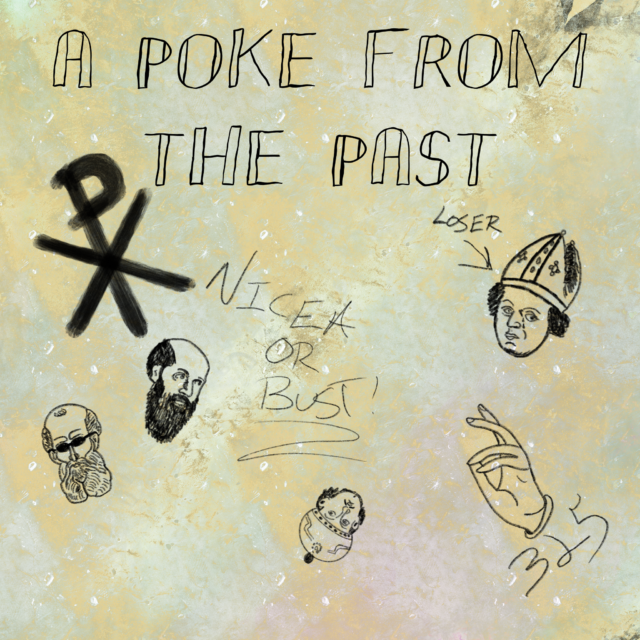
“There is only one physician, who is both flesh and spirit, born and unborn, God in man, true life in death, both from Mary and from God, first subject to suffering and then beyond it, Jesus Christ our Lord.”
The Letter of Ignatius to the Ephesians-106-107 A.D.
Defining the Trinity
Two of the most attacked doctrines in church history and among cults today are the Trinity and the Deity of Christ. These doctrines have been misunderstood and therefore attacked for many centuries. If we are going to have the correct foundation, then we as Christians must be able to accurately define and biblically defend these two foundational doctrines. I cannot write about various heresies in church history or cults without first clearly defining the Trinity and the Deity of Christ. With this in mind, I, with the help of the church fathers, am going to give my most biblical and accurate definition of the Trinity. I will save the Deity of Christ for a different day.
The Definition
Within the one Being that is God, there exists eternally three coequal and coeternal persons, namely, the Father, the Son, and the Holy Spirit.2
James White
The first truth to take away from the above statement is that we as Christians are fundamentally monotheists. The Father, the Son, and the Holy Spirit all share the divine name of YAHWEH because there is only one being of God. We are not polytheists. We do not believe that Jesus is a god, and the Father is a separate god, and the Holy Spirit is another god. There is only one being of God. This is the historic belief of Christianity and Judaism. There are many passages of Scripture that support this, like the Shema in Deuteronomy 6:4 which says, “Hear, O Israel: The LORD our God, the LORD is one.” This is not an exhaustive list, but other passages to consider are Deuteronomy 4:35-39, Isaiah 43:10, Isaiah 44:6, Isaiah 45:5, and Jeremiah 10:11-12. Jesus himself quotes the Shema to a scribe in Mark 12:29-30 affirming that Jesus Himself was a monotheist.
The next important truth is that the Being of God cannot be divided. God is an infinite and unique Being. Jeremiah 23:24 asks, “Can a man hide himself in secret places so that I cannot see him? Declares the LORD. Do I not fill heaven and earth? Declares the LORD.” 1 Kings 8:27 also says, “But will God indeed dwell on the earth? Behold, heaven and the highest heaven cannot contain you; how much less this house that I have built.” While God chose to dwell among his people, the Being of God cannot be contained because he is an infinite Being. God is immanent with His people, but He is also transcendent over His creation.
Secondly, since God is unique, there is no one else like Him. Tertullian, when writing against Marcion in the early third century, had this to say,
“God is the great Supreme existing in eternity, unbegotten, unmade without beginning, without end… Surely it must be that nothing is equal to Him, that there is no other great Supreme; because, if there were, He would have an equal; and if He had an equal, He would be no longer the great Supreme.”4
Tertullian
Thinking back to Isaiah 44:6, God proclaims that He is the first and the last, besides Him there is no God. He then asks rhetorically, “Who is like me?” with the obvious answer being that none is like Him. The way that God shows His uniqueness as the only true, unbegotten God is He asks so-called gods to declare what is to come and what will happen in the future (Isaiah 44:7), the point being that only the true God knows what is to come and the purpose behind why it will come about. The uniqueness of God is explicitly shown in Isaiah 40-49.
Next, there are three divine persons who fully share the one Being that is God. The distinction between “being” and “person” is vitally important. We recognize this distinction every day. An example that I found to be illuminating comes from Dr. James White. If I pick up a rock and were to hit someone with it, the person will feel it because a rock has being. However, if the person insulted the rock after being hit by it, the rock would not care because it does not possess personhood. In other words, there are many things that exist which have being but which are not personal. God, however, has being but is also personal and because His being is eternal and infinite, His being can be shared by three persons.
no matter how far you push the Word back into eternity, the Word was with God and the Word was God.
Heath Bowles
Finally, God cannot be thought of as a divine fraction, where the Father is a third of God, the Son is a third of God, and the Holy Spirit is a third of God. Each person is fully God and has been fully God for all eternity. John 1:1-3 says, “In the beginning was the Word, and the Word was with God, and the Word was God. He was in the beginning with God. All things were made through him, and without him was not any thing made that was made.” John starts his gospel with the words, “In the beginning.” The Greek words that John uses in his gospel for, “In the beginning” are the same words that are found in Genesis in the Greek Septuagint which was the common Old Testament Scriptures for the New Testament church. Why would John start his gospel in this fashion? The point that John is undoubtedly making in the prologue is that no matter how far you push the Word back into eternity, the Word was with God and the Word was God. Jesus was with the Father. Likewise, the Holy Spirit is also eternal and was with Jesus and the Father in creation (Genesis 1:1-2).
Creation of the universe is an act that can only be attributed to God.5 Furthermore, in Acts 5:1-4 Ananias and his wife, Sapphira, sold a piece of property, and Ananias kept some of the proceeds for himself. Peter asked Ananias why he had lied to the Holy Spirit (Acts 5:3). A verse later Peter tells him that he did not lie to man but to God. God and the Holy Spirit are used interchangeably by Peter.6 In 2 Peter 1:21, Peter says, “For no prophecy was ever produced by the will of man, but men spoke from God as they were carried along by the Holy Spirit.” This is the most insightful verse for understanding how God used people to produce the Scriptures that we possess. Peter as an apostle of Jesus Christ believed the Holy Spirit was God. Finally, the Holy Spirit proceeds eternally from the Father and the Son (John 14:15-26).
The Orthodox Conclusion: The Nicene Creed
We believe in one God, the Father, the Almighty, maker of heaven and earth, of all that is, seen and unseen.
We believe in one Lord, Jesus Christ, the only Son of God, eternally begotten of the Father, God from God, Light from Light, true God from true God, begotten, not made, of one Being with the Father; through him all things were made. For us and for our salvation He came down from heaven, was incarnate of the Holy Spirit and the Virgin Mary and became truly human. For our sake he was crucified under Pontius Pilate; He suffered death and was buried. On the third day He rose again in accordance with the Scriptures; He ascended into heaven and is seated at the right hand of the Father. He will come again in glory to judge the living and the dead, and His kingdom will have no end.
We believe in the Holy Spirit, the Lord, the giver of life, who proceeds from the Father and the Son, who with the Father and the Son is worshipped and glorified, who has spoken through the prophets.
We believe in one holy, catholic (universal), and apostolic Church. We acknowledge on baptism for the forgiveness of sins.
We look for the resurrection of the dead, and the life of the world to come. Amen.
Translation: The English Language Liturgical Consultation
Scripture to Consider:
Acts 5:1-11; Genesis 1:1-2; John 1:1-13; Hebrews 1:10; Psalm 102:25; 2 Peter 1:20-21; Isaiah 40-49; Jeremiah 10:11-12; Deuteronomy 4:35-39; Deuteronomy 6:4-5; Psalm 139; John 14:15-26
Recommended Reading:
The Forgotten Trinity: Recovering the Heart of Christian Belief by Dr. James White
Faith of our Fathers: A Study of the Nicene Creed by L. Charles Jackson
Bibliography
White, James. The Forgotten Trinity: Recovering the Heart of Christian Belief. Bloomington, MN. Bethany House Publishers, 1998.
God the Holy Spirit.” January 2017. Retrieved from: https://tabletalkmagazine.com/daily-study/2017/01/god-holy-spirit/
The Apostolic Fathers. Third ed. Translated by Michael W. Holmes. Grand Rapids, MI. Baker Academic, 2007.

Heath Bowles is a frequent contributor for The Poking Stick blog, and a childhood friend of Cory Woodard. Heath has a love for church history and apologetics, and knows more about Mormonism than must Mormons. Heath is a coffee enthusiast and a recovering sneakerhead.
2 comments
Comments are closed.